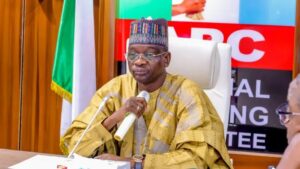Dalori’s Leadership and Tinubu’s Renewed Hope Agenda
*The Master Strategist at the Helm of APC
By Morgan Adikwu
The emergence of Alhaji Ali Bukar Dalori as the acting National Chairman of the All Progressives Congress (APC) comes not merely as a constitutional transition, but as a timely elevation of a tested party general, a tactician forged in the crucible of grassroots politics, administrative precision, and loyal service.
Following the resignation of Dr. Abdullahi Umar Ganduje, the party constitution in Section 14(2)(iii) gave clear direction. And in that clarity, Dalori, the Deputy National Chairman (North), assumed the mantle with calm assurance, ready to steer the APC through one of the most defining phases of its national life.
But Dalori is not stepping into unknown terrain. Far from it. His journey through the political labyrinth of Nigeria, especially in the volatile but pivotal North-East, has refined in him the political savvy, strategic foresight, and deep understanding required to manage the affairs of a ruling party with national stakes. He is not a stopgap chairman. He is the compass bearer for APC’s next strategic direction.
At a time when the APC is under intense scrutiny, both internally and externally, and as the administration of President Bola Ahmed Tinubu seeks to consolidate its Renewed Hope Agenda, Dalori represents a stabilizing force—a pragmatic political realist with both grassroots credentials and executive insight. His leadership is a bridge between legacy loyalty and reformist momentum.
His background as Chairman of the APC in Borno State is not mere trivia; it is a confirmation to his ability to traverse political minefields, galvanize fractured interests, and maintain party supremacy in one of Nigeria’s most security-challenged zones. The result? APC’s dominance across local and federal elections in the state remained unshaken.
Dalori’s evolution embodies the Power Elite Theory by C. Wright Mills—he is one of the few whose influence transcends electoral cycles. Yet, unlike many who operate behind veils of elitism, Dalori maintains his footing among the masses, a master in the art of representation, the core purpose of any political party.
In the Machiavellian sense, Alhaji Dalori possesses what Niccolò Machiavelli termed “virtù”: not just personal virtue, but the ability to shape fortune through calculated decisions, flexibility, and firm resolve. He is a quintessential political strategist, blending emotional intelligence, strategic thinking, and adaptive pragmatism to wield power not for show, but for substance.
Under his stewardship, the APC is poised to realign its priorities with its founding manifesto; economic empowerment, national unity, internal democracy, and security. With Tinubu’s presidency offering a renewed national direction, Dalori is set to become the political engine room driving cohesion between the party structure and government policies.
The APC, like any big-tent political movement, has faced its share of turbulence, from internal factions, court litigations, zoning controversies in some States, to credibility tests in the public square. But as acting chairman, Dalori’s ascendancy provides a rare convergence of legitimacy, competence, and timing.
With a seasoned hand on the wheel, the party’s National Working Committee (NWC) will likely see improved cohesion, as Dalori is not just respected, he is trusted. The politics of exclusion and power rivalry, which have plagued past leaderships, stand no chance under a man who understands that a political party, at its core, must first be a family before it becomes a vehicle of governance.
Dalori’s leadership can serve as the lever for repositioning the APC as not only an electoral machine but as a platform for policy formulation, civic engagement, and inclusive governance and a nod to the multifaceted role of political parties in a democracy.
As the Tinubu administration grapples with inflation, security, food security, and youth unemployment, the APC under Dalori’s guidance must take on the role of a policy think tank, connecting government action to party ideology and people’s needs.
President Tinubu, often celebrated for his knack for assembling winning teams, can count on Dalori as his “Joker” card in the political deck, a wild card that brings unexpected strength, strategy, and calm to the storm. His loyalty is not transactional. It is ideological.
In the complex political chessboard of Nigeria, where actors often sacrifice long-term gains for short-term expediency, Dalori offers a different tone; patience, persistence, and principle. His mastery of the game is not in making noise, but in moving pieces when it matters most.
While Alhaji Ali Bukar Dalori currently serves in an acting capacity, his tenure offers more than administrative continuity, it offers visionary leadership, strategic harmony, and a renewed focus on the foundational ideals of the APC.
If the party must reengineer its image, reconnect with its base, and reinvent itself as a genuine agent of change, then Dalori must not only be supported, he must be empowered.
Because sometimes, it is not elections that define a party, but moments like this, it’s when the right man steps in, at the right time, for the right reasons.
And in Ali Bukar Dalori, the APC, the Tinubu administration, and indeed Nigeria, may have just found that man.
